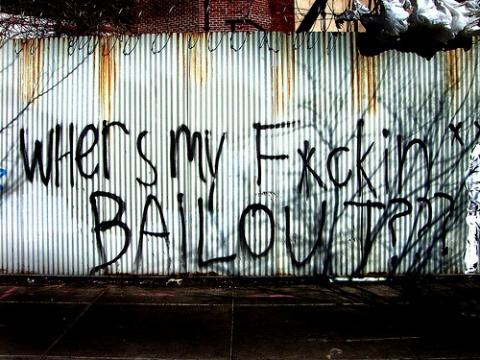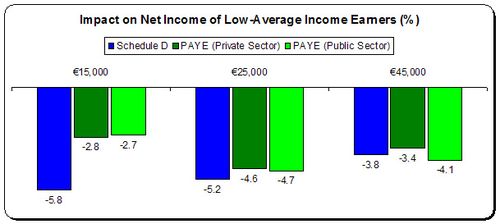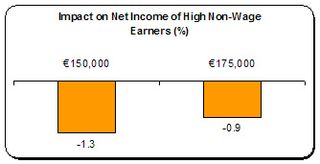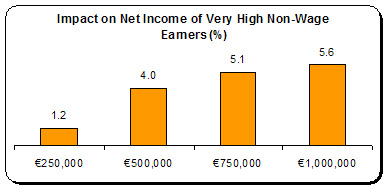The creepy millionaires' budget

(This article originally appeared on Michael Taft's Notes on the Front)
The ‘creepy’ in this budget is in the detail which the Government didn’t reveal.
Social welfare rates will fall by 4 per cent (except for pensioners). Regarding low-average earners this is what the budget tables tell us.
All low-average income earners – self-employed and PAYE (both private and public sector) will suffer considerable falls in income.

This is where it starts getting really creepy. Those who receive income via rents, dividends, interest and self-employment (non-wage income, or Schedule D taxpayers) are, unsurprisingly, the wealthiest in society. When we hit the stratosphere of high earnings – over €150,000 per anum – those who receive income via non-wages make up nearly 75 percent of all income received above that level; the remaining 25 percent comes from high-earning PAYE taxpayers (e.g. managers, executives, higher professionals, etc.).
What happens to these high-income, non-wage earners? According to the budget tables, they get off pretty lightly – seeing their net income fall by approximately 1 percent. Contrast that with low-average income earners, including social welfare income. It’s substantially less.

But this is where it gets really creepy. The budget tables stop their comparisons at €175,000. With the help of the Deloitte tax calculator, we can go higher. This is what Deloitte tells us for non-wage incomes that leave the stratosphere and circle far above the planet the rest of us live on.

That’s right – those are not negative figures. Budget 2011 provides considerable tax breaks for those on very high non-wage incomes. If you happen to be a millionaire you are nearly 6 percent better off with Fianna Fail’s budget. How does this occur?
This is how Deloitte breaks down the millionaire’s budget. They will pay €11,936 more on income tax and PRSI. However, under the Universal Social Charge, they pay €34,931 less than under the Health and Income levies which the Charge replaces. That really puts the ‘Social’ in Universal Social Charge.
And at the risk of totally creeping you out, the ESRI estimates that there will be no wage-growth next year. However, non-wage income (rents, dividends, interest, and self-employment) will grow by 29 per cent. So those very high non-wage earners can look forward to not only an increase in their incomes, but tax breaks on top of that.
Truly, a millionaire’s budget.
(Image top via ganghiscon on Flickr)
